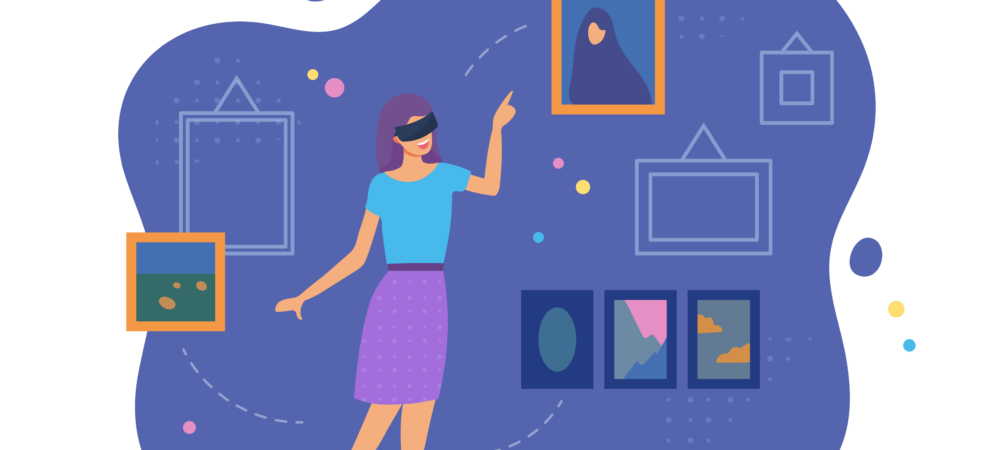Made in Europe: 5 European XR startups at the service of art that you should know about.
European cultural heritage is undergoing a process of transformation related to digitalisation and online accessibility of cultural material.
Virtual reality is one of the technologies with the greatest potential that spans across different fields such as training, education and medicine, among others. In recent years, the application of this technology in cultural knowledge has been on the rise.
Now, access to cultural places has been challenging due to mobility restrictions because of the COVID-19 pandemic. But, at the same time, it has opened a new opportunity for museums to fully embrace VR and create an enhanced experience for the visitor.
Virtual reality is an excellent tool for cultural institutions, for it offers an innovative and different experience: the total immersion in the exhibition. Many museums around the world are already taking advantage of its potential, such as the Louvre Museum.
In particular, virtual reality can address some of the shortcomings related to visiting physical museums, such as long queues or difficulties to admire highly recognized artworks due to large crowds concentrated in the same place.
Virtual experiences remove all these problems: the visitor can get right in front of their favourite masterpiece and explore them without any time limitation. In addition, the level of detail for any type of artistic representation achieved through VR has substantially improved as the advances in technology over the years.
Another benefit of using XR in cultural heritage is preservation. Making sites accessible through VR allows curbing the over-exploitation of these places. Therefore, immersive technologies let visitors experience places that they would not be able to visit otherwise, due to safety and conservation regulations.
Finally, VR tours can become an especially useful tool for people who, due to any kind of disability, cannot visit places with complicated access, such as caves or ruins.
XR4ALL presents 5 XR European startups that have contributed to globally distribute cultural and artistic heritage in a sustainable way: Emissive Studio, Zoan, Opuscope, Preloaded and Moyosa Media.
Emissive studio (France)
Founded in 2005, the Paris-based Emissive studio produces AR and VR experiences.
In partnership with HTC Vive Arts, Emissive Studio has created the experience Mona Lisa: Beyond the Glass, the first VR experience presented by the Louvre museum, to commemorate the 500th anniversary of Leonardo Da Vinci’s death. Opened to the public in October 2019, it can still be accessed from platforms such as VIVE port or Steam at no monetary cost.
In this immersive experience, the user has the privilege to scrutinise every detail of the masterpiece by looking closely, beyond the real-life special glass that usually protects the portrait, and watch Mona Lisa come to life.
Preloaded (UK)
The London-based games studio founded in 2000, produces games and immersive experiences.
Partners such as the BBC and British museums have worked with Preloaded to create ambitious projects.
By collaborating with the Tate London museum, Preloaded has created the VR experience MODIGLIANI VR: THE OCHRE ATELIER, in which it is possible to get unique insights on the work of the Italian painter and Sculptor, as part of a fully integrated VR experience within a wider exhibition.
Moyosa Media (Netherlands)
Launched in 2013, the Assen-based digital agency produces cutting-edge experiences in AR, VR and MR.
In 2018, Moyosa Media made the Kremer Museum accessible to the public through VR, thus allowing visit a virtual museum in which 74 Dutch and Flemish Old Master paintings from the Dutch Golden Age are displayed.
Through the virtual tour, users can walk around the virtual space of the gallery as if they were in a real museum.
The Kremer Museum includes pieces by Rembrandt (“old man with a turban”), Aelbert Cuyp, Frans Hals and many more Old Masters from the Dutch Golden Age.
To enjoy the experience, the app is available on Viveport and Steam (€9.99).
Zoan (Finland)
Launched in 2010, Zoan is the largest VR studio in Finland that specialises in 3D and VR storytelling.
The Lahti-based company has been in charge of producing “Virtual Helsinki”, a digital twin of the Helsinki city centre.
As a complement to this project, Zoan produced a VR event in Helsinki city centre for Finland’s National Party (May Day) that took place during the COVID-19 lockdown. 12% of Finland’s total population attended this massive concert and 1.4 million people watched globally, becoming the largest XR event in history, according to organisers.
In 2018, Zoan collaborated with the National Museum of Finland in Helsinki to produce a VR exhibit, in which visitors could explore R.W. Ekman’s painting The Opening of the Diet 1863 by Alexander II.
Opuscope (France)
Based in Paris and launched in 2016, Opuscope offers interaction with 3D images in mixed reality.
The startup has developed the platform Minsar Studio, with which anyone with no-coding experience can easily create AR and VR immersive experiences just by drag-and-dropping.
In 2016, Minsar was selected by the French Ministry for Culture to spread virtual visits widely.
In Minsarcheo, visitors are invited to observe digital copies of the actual pieces of art disseminated through the room, allowing close inspection or interaction.
About XR4ALL
XR4ALL is an initiative funded by the European Union’s Horizon 2020 programme to push the XR European industry forward. XR4ALL aims to become a meeting point for the EU XR community.
Innovative and groundbreaking EU XR technology and research will be featured in the portal forging a competitive and sustainable ecosystem of European technology providers active in XR.
Become a member & subscribe to our newsletter to know more about the European XR scene!
